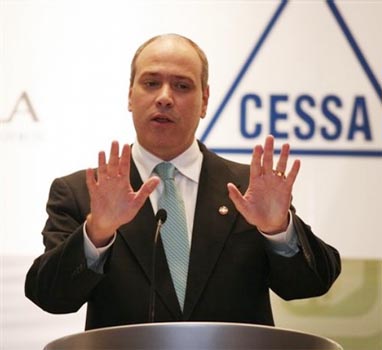Ruling-party candidate says reconciliation still elusive
 San Salvador, El Salvador - After a long campaign characterized by personal attacks, Rodrigo Avila - the ruling-party candidate in Sunday's presidential election - insists that El Salvador has yet to attain "political peace."
San Salvador, El Salvador - After a long campaign characterized by personal attacks, Rodrigo Avila - the ruling-party candidate in Sunday's presidential election - insists that El Salvador has yet to attain "political peace."
In an interview with Deutsche Presse-Agentur dpa, he said that a potential triumph by his only competition in the election would put El Salvador "within the realm of influence" of Hugo Chavez.
Leftist Mauricio Funes has denied such allegations.
"It is unavoidable," the right-wing former police chief Avila said.
His party, the Nationalist Republican Alliance (ARENA), has held power for 20 years under four different presidents.
But Avila insists that he that he has an agenda for change.
"This is not just about parties. It is about historical moments and about people, about teams, and we have a new vision for the country," he said.
Yet, he touts the achievements of past ARENA governments. Illiteracy and poverty rates have fallen, inflation has been low for the region and democracy has grown since the 1980-92 civil war, he said.
"It was under an ARENA government that peace was signed, that the country was rebuilt after the war," Avila said.
But El Salvador has yet to "bring down the walls of political polarization," he said. "The peace agreements were signed, peace was achieved, but political peace is still pending."
Avila insists that he will seek to integrate the fractured Salvadoran society. As an example, he recalled his efforts as police chief, in which he incorporated members of the dictatorship's security forces with former leftist rebels and civilians.
"Initially everyone thought that it would not work," he said. "But in the end it worked."
Avila, who has the support of the business community, proposes a system that is based on economic liberties but with supervision, which motivates the private sector to show "greater solidarity" with the rest of society.
"I believe that there have to be controls, parameters," he said, "and there have to exist in some way frameworks for supervision and for policy development or for a social market culture." (dpa)